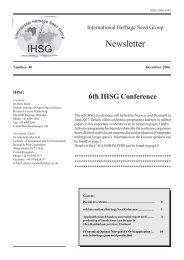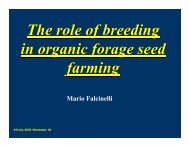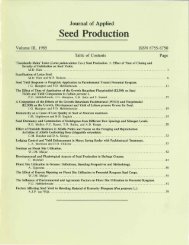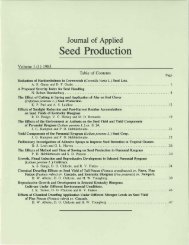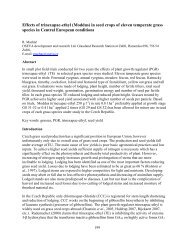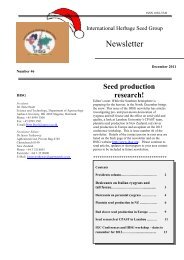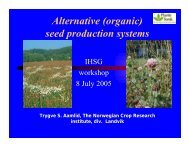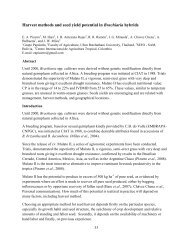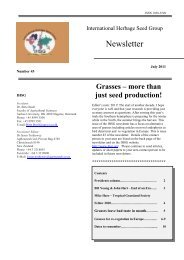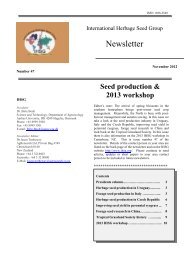- Page 1 and 2:
Proceedings of the 7th Internationa
- Page 3 and 4:
Table of ContentsORAL PRESENTATIONS
- Page 5 and 6:
Seed yield components and yield per
- Page 7 and 8:
International Herbage Seed Conferen
- Page 9 and 10:
16:15 - 16:30 Reliability of salini
- Page 11 and 12:
Hotel expense is covered for night
- Page 13 and 14:
40,000 were slaves (McDonald, 2007)
- Page 15 and 16:
Fig. 1. Texas AgriLife Research and
- Page 17 and 18:
$7 billion for cattle, $3 billion f
- Page 19 and 20:
principle and encourages both AgriL
- Page 21 and 22:
eceived by growers, the above perce
- Page 23 and 24:
seed conditioning plants are locate
- Page 25 and 26:
Table 4.Hectares of open-field burn
- Page 27 and 28:
system, a seed crop is produced fro
- Page 29 and 30:
Fig. 1. Land resource areas of Texa
- Page 31 and 32:
y land owners. Seed yields are low
- Page 33 and 34:
The influence of planting density o
- Page 35 and 36:
Simple correlation and regression a
- Page 37 and 38:
Variation in seed shattering in a g
- Page 39 and 40:
Seed retention (SR) was calculated
- Page 41 and 42:
mm160120Precipitation8040020Km h -1
- Page 43 and 44:
Young, B. A. (1986). A Source of Re
- Page 45 and 46:
Several methods are commonly used f
- Page 47 and 48:
Table 3. Effect of the length of ha
- Page 49 and 50:
Alfalfa seed production in semi-hum
- Page 51 and 52:
Rather near the meteorological stat
- Page 53 and 54:
ReferencesBolaños-Aguilar E.D., Hu
- Page 55 and 56:
ased bioenergy conversion plants wa
- Page 57 and 58:
Table 1. Average distances required
- Page 59 and 60:
Figure 1. Optimized locations for 1
- Page 61 and 62:
Perennial ryegrass (Lolium perenne
- Page 63 and 64:
Relative Seed Yieldsingle composite
- Page 65 and 66:
Flowers, M.D.; Hart, J.M.; Young II
- Page 67 and 68:
Thus, similar to tissue tests, remo
- Page 69 and 70:
Conclusion:Perhaps our most importa
- Page 71 and 72:
Modelling critical NDVI curves in p
- Page 73 and 74:
The five spectral reflectance measu
- Page 75 and 76:
Harvest loss in ryegrass seed crops
- Page 77 and 78:
Larger than expected harvest losses
- Page 79 and 80:
Rolston, P.; Trethewey, J.; McCloy,
- Page 81 and 82:
Optical sensors have the potential
- Page 83 and 84:
Figure 2. Seed yield response to ap
- Page 85 and 86:
Flowers, M. D., Hart, J.M., Young I
- Page 87 and 88:
In 2010, France has launched the fo
- Page 89 and 90:
Yield (% maximum)ConclusionThe resu
- Page 91 and 92:
Plant N uptakeN unavailableSoil nit
- Page 93 and 94:
Stresses associated with germinatio
- Page 95 and 96:
correspond to electrical conductivi
- Page 97 and 98:
applied later in the fall was more
- Page 99 and 100:
Figure 2. Establishment of five ove
- Page 101 and 102:
The seed vigour testing was perform
- Page 103 and 104:
Table 1. Germination index (GI) for
- Page 105 and 106:
Reliability of salinity screening L
- Page 107 and 108:
AcknowledgmentThis research was sup
- Page 109 and 110:
Table 2. Greenhouse salinity screen
- Page 111 and 112:
The seeds were collected from the A
- Page 113 and 114:
increases germination to its potent
- Page 115 and 116:
Light, lodging and flag leaves-what
- Page 117 and 118:
Relative seed yieldSeed yield (kg/h
- Page 119 and 120:
Hampton, J.G.; Clemence, T.G.A.; He
- Page 121 and 122:
The seed set is of major importance
- Page 123 and 124:
In grass species with poor seed ret
- Page 125 and 126:
support system to optimize fungicid
- Page 127 and 128:
weather stations in grass seed fiel
- Page 129 and 130:
ust resistance loci in Lolium peren
- Page 131 and 132:
Seed yield variation in a red clove
- Page 133 and 134:
100Seed yield plant -1 (g)806040200
- Page 135 and 136:
Marden, J. H. 1984. Remote percepti
- Page 137 and 138:
Crimson clover seed production in t
- Page 139 and 140:
Piper, C.V. 1935. Forage plants and
- Page 141 and 142:
deal of investigation into the caus
- Page 143 and 144:
genes and subsequent ability to pro
- Page 145 and 146:
Gatenby, W.A., S.C. Munday-Finch, A
- Page 147 and 148: Control of Vulpia myuros in red fes
- Page 149 and 150: The strip design provides an opport
- Page 151 and 152: The pot experiments did not reveale
- Page 153 and 154: CharacterWeed abundance1 A few plan
- Page 155 and 156: Jensen, P. K. (2010) Longevity of s
- Page 157 and 158: Effects of intraspecific competitio
- Page 159 and 160: flowering, Gangi accumulated a high
- Page 161 and 162: The seed yield of Gangi was, on ave
- Page 163 and 164: Seed yield components and yield per
- Page 165 and 166: ResultsVariation among populations
- Page 167 and 168: Table 2. Means of total seeds per p
- Page 169 and 170: Ryle, G. J. (1970). Partition of As
- Page 171 and 172: Control of Apion trifolii in red cl
- Page 173 and 174: Number of seeds /inflorescencesimil
- Page 175 and 176: population. However, in spite of th
- Page 177 and 178: Corvallis where they were debearded
- Page 179 and 180: Table 1. Effect of Palisade growth
- Page 181 and 182: Variations on potential and harvest
- Page 183 and 184: Determination of optimum desiccatio
- Page 185 and 186: Relative seed yield (%)Flowers/m225
- Page 187 and 188: Harvesting too soon after peak flow
- Page 189 and 190: Annual ryegrass seed production in
- Page 191 and 192: seed yield, kg/haExtractable Al, mg
- Page 193 and 194: ReferencesHaby, V.A. (1995). Soil m
- Page 195 and 196: Kentucky bluegrass (Poa pratensis L
- Page 197: urn residue management (Fig. 1 and
- Page 201 and 202: Development of new tetraploid Chlor
- Page 203 and 204: Following 4 (or 5) cycles of select
- Page 205 and 206: Loch, D.S., Rethman, N.F.G. & van N
- Page 207 and 208: KBGcocksfootHykorLofatimothymeadowf
- Page 209 and 210: Figure 2 Relative seed yield (%) se
- Page 211 and 212: and GA 4 . In consequence this inac
- Page 213 and 214: Table 1 The effect of trinexapac-et
- Page 215 and 216: Silberstein, T.B., Young, W.C. III,
- Page 217 and 218: inflorescece number and seed yield
- Page 219 and 220: Germination of Lolium multiflorum g
- Page 221 and 222: Effect of sowing density on seed yi
- Page 223 and 224: y-products of this grass seed crop
- Page 225 and 226: Table 2. Effect of PGR on seed yiel
- Page 227 and 228: Further culm length measurements ga
- Page 229 and 230: chlorophyllometer. Measurements wer
- Page 231 and 232: Table 2. Photosynthesis rate of fla
- Page 233 and 234: Organization of grass seed research
- Page 235 and 236: Path Coefficient and Ridge Regressi
- Page 237 and 238: through y4 (0.133). Increasing y 1
- Page 239 and 240: Newell G.J., Lee B. (1981)Ridge reg
- Page 241 and 242: Relative humidity, seed moisture co
- Page 243 and 244: Ergovaline contents in grasses from
- Page 245 and 246: 11.8 % (Central East) to 40.0% (Nor
- Page 247 and 248: ReferencesBony, S. & Delatour, P. (
- Page 249 and 250:
Long-term Evaluation of Annual Ryeg
- Page 251 and 252:
seed yield. All systems of establis
- Page 253 and 254:
Preliminary results after four year
- Page 255 and 256:
Casals, Marie-LaureFNAMSImpasse du
- Page 257 and 258:
Mao, PeishengForage Seed LabChina A
- Page 259 and 260:
Vanasche, DavidVanasche Farm36130 N



